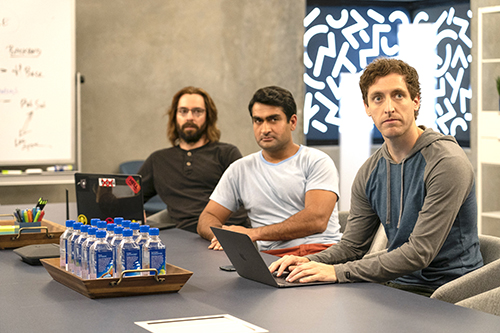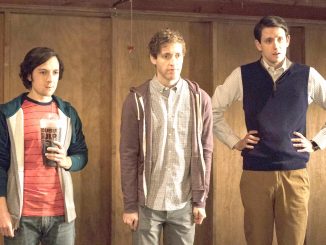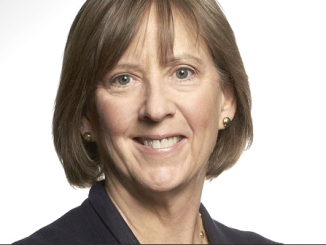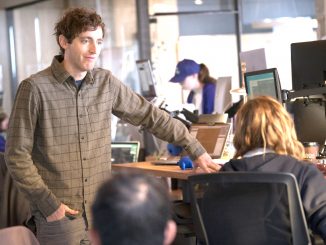
BY JAMIE MORROW
Daily Post Associate Editor
The writers of HBO’s “Silicon Valley” love nothing more than to skewer the idea that companies here want to make the world a better place.
OK, maybe they like penis jokes a little more. But poking at those lofty ideals is a close second. And last night’s episode, “Hooli Smokes!,” comes at it more explicitly than ever.
The show’s brilliant startup founder Richard Hendricks (Thomas Middleditch) sincerely yearns to see his tech brought to life and his idea of a decentralized democratic internet take off — and he really does care more about that than about becoming rich. But while he may not care so much about money, the people he’s working with at Pied Piper certainly do.
“He would have turned us into the worst possible versions of ourselves,” Richard tells CFO Monica (Amanda Crew) and fellow programmers Dinesh (Kumail Nanjiani) and Gilfoyle (Martin Starr) as he explains why he declined a $1 billion investment from a very bad man who would have made them all very, very rich. You can’t put a price on principles. Or can you? Maybe $1 billion from an investor who wants to strip-mine your users’ data isn’t worth your principles, but by the end of last night’s episode, Richard and company save themselves by embracing spite, playing dirty, and recruiting a sacrificial sap who will lose some $40 million. So really… maybe you can put a price on principles. Richard holds dear the thought of his pure and unspoiled new internet, but by this point in the show he’s done a lot of dirty deeds to try to make it happen.
Rejected investor retaliates
As the episode begins, the rejected investor has partnered with a rival of Pied Piper’s to poach away the game developer who was financially sustaining their company — but who was also making Richard’s promise to not surveil or exploit his platform’s users a lie. Worse, the investor has bought stakes held by other people and gotten control of 30% of the company. If Pied Piper tries to stay afloat by selling more shares, he’ll buy them and take over.
While contemplating the situation against the scenic backdrop of the Stanford dish, who should Richard run into but the show’s perennial villain, Hooli CEO Gavin Belson (Matt Ross). Hooli was once the show’s over-the-top parody of a tech behemoth — for my money, its Google stand-in — but it’s fallen on hard times in the last few episodes, as Gavin’s ego has run it into the ground. Now, the finale of the previous season had Richard and company triumph over Gavin precisely by remembering that he is ruthless and utterly spiteful. They’ve gone back and forth with him over the seasons, but he’s always proven to be malicious above all. So it’s astounding that Richard lets himself forget that here. They have a seemingly sympathetic conversation about their troubles, and then Richard comes up with a solution that could save both companies and benefit both equally. Cue the poignant music. And Gavin cheerfully rejects it.
“We just spent the last hour bonding about how this business is comprised of backstabbers and cutthroats,” Richard sputters.
“Yes, exactly,” Gavin replies. “That’s what this is. It’s a little weird you don’t get it.”
It is weird indeed, and a rare misstep from the show’s writers.
Why not walk away?
Between a rock and a hard place, Richard contemplates giving up and walking away with a good chunk of money — an opportunity he’s had and rejected so many times over the course of this show that Dinesh asks him if he has a sick addiction to giving up money. Certainly he now also has the interests of 500 employees to consider. But this is “Silicon Valley,” so instead we get a little corporate caper sequence in which the Pied Piper crew takes advantage of Hooli’s low share price, Gavin distracted by cheating his way through a charity triathlon and a cousin of Dinesh who’s had a windfall and uses those elements to buy Hooli out from under Gavin.
At which point, if there were any masks left to drop … well, they are no more. Back in Season 2, Gavin told his employees, “I don’t want to live in a world where someone else makes the world a better place better than we do.” It’s been years and that line has stuck with me as one of the show’s best and most pointed.
As he tries to persuade one of his board members to stop the sale, Gavin lets it all go. Forget all the B.S. about making the world a better place, he says. The iconic companies of the Valley are helmed by “savages” who fight dirty to end up on top.
“Zuckerberg and Jobs and me, Gavin Belson,” he says proudly. Nevertheless, the sale goes through.
Spite and karma
Meanwhile, Dinesh has always been the Pied Piper member most interested in striking gold. While he’s top-notch on the technical end, what he really wants is prestige — and the money to buy it with. By this point, he feels both entitled and cheated. Everyone else in the Valley is practically falling into money, so why not him? He’s been so close, so many times.
Along comes his cousin, Wajid, who’s just come into a surprise windfall via an acquisition. A windfall that Dinesh could have shared in had he not sold his shares of Wajid’s company to fund his pursuit of prestige via Tesla add-ons. Despite being a self-described LaVeya Satanist, frenemy Gilfoyle tells him karma may be at work. Dinesh protests that he’s a good person, but when Pied Piper winds up needing some money to help buy Hooli — money they know will be lost when artificially inflated valuations settle back down — Dinesh is absolutely willing to run with his spite and envy and recruit Wajid to be their sacrificial lamb. His mask drops, too.
Other notes:
• Best line of the episode: “I pay taxes!” Gavin exclaims. “I mean, I don’t, but (shrug).”
• Jared (Zach Woods) is still angry at Richard, but he helps them conquer Hooli. Reconciliation seems afoot.
• Monica, the only non-programmer, beats all the coders at being a human calculator — when it comes to finance math, anyway.
Email Jamie Morrow at [email protected].



